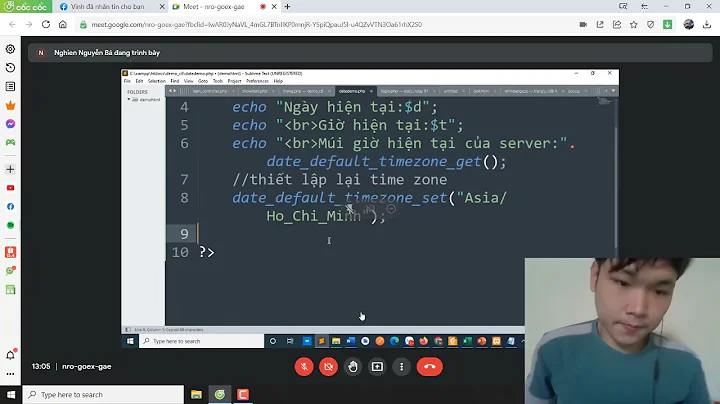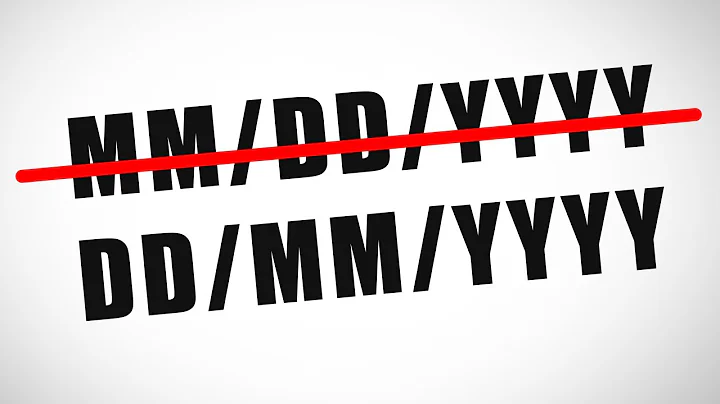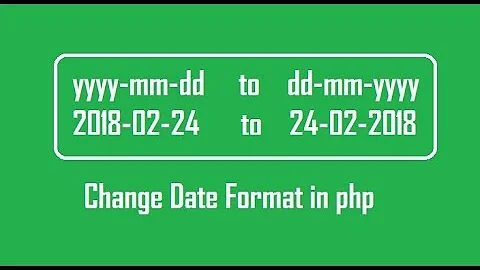PHP date format /Date(1365004652303-0500)/
Solution 1
First you need to understand the format you have
/Date(1365004652303-0500)/
Then you have
- time stamp (U) = 1365004652
- Milliseconds (u) = 303
- Difference to Greenwich time (GMT) (O) = -0500
Build a Format
$date = '/Date(1365004652303-0500)/';
preg_match('/(\d{10})(\d{3})([\+\-]\d{4})/', $date, $matches);
$dt = DateTime::createFromFormat("U.u.O",vsprintf('%2$s.%3$s.%4$s', $matches));
echo $dt->format('r');
Output
Wed, 03 Apr 2013 15:57:32 -0500
^
|= Can you see the GMT ?
interface DateFormatParser
{
/**
* @param $string
*
* @return DateTime
*/
public function parse($string);
}
abstract class PregDateParser implements DateFormatParser
{
protected $pattern, $format, $mask;
public function parse($string) {
$string = (string)$string;
$pattern = $this->pattern;
$format = $this->format;
$mask = $this->mask;
$r = preg_match($pattern, $string, $matches);
if (!$r) {
throw new UnexpectedValueException('Preg Regex Pattern failed.');
}
$buffer = vsprintf($mask, $matches);
$result = DateTime::createFromFormat($format, $buffer);
if (!$result) {
throw new UnexpectedValueException(sprintf('Failed To Create from Format "%s" for "%s".', $format, $buffer));
}
return $result;
}
}
class JsonTimestampWithOffsetParser extends PregDateParser
{
protected $pattern = '/^\/Date\((\d{10})(\d{3})([+-]\d{4})\)\/$/';
protected $format = 'U.u.O';
protected $mask = '%2$s.%3$s.%4$s';
}
$date = '/Date(1365004652303-0500)/';
$parser = new JsonTimestampWithOffsetParser;
$dt = $parser->parse($date);
echo $dt->format('r');
Solution 2
Try this out:
var_dump(date('Y-m-d H:i:s', '1365004652303'/1000));
$str = '/Date(1365004652303-0500)/';
$match = preg_match('/\/Date\((\d+)([-+])(\d+)\)\//', $str, $date);
$timestamp = $date[1]/1000;
$operator = $date[2];
$hours = $date[3]*36; // Get the seconds
$datetime = new DateTime();
$datetime->setTimestamp($timestamp);
$datetime->modify($operator . $hours . ' seconds');
var_dump($datetime->format('Y-m-d H:i:s'));
Returns:
string(19) "2013-04-03 17:57:32"
string(19) "2013-04-03 12:57:32"
Solution 3
Let's break /Date(1365004652303-0500)/ down to:
- Date
- 1365004652303
- -0500
First string makes itself pretty clear.
The next large number is the epoch value
The -0500 represents the timezone in which the dates were originally stored. It is relative to UTC and thus, it is referring to Eastern Standard Time.
EDIT
The epoch is with a milisecond precision. Try this code:
<?php
$str = "/Date(1365004652303-0500)/";
preg_match( "#/Date\((\d{10})\d{3}(.*?)\)/#", $str, $match );
echo date( "r", $match[1] );
?>
You can also use the timezone for setting the date relative to your own. http://codepad.viper-7.com/RrSkMy
Solution 4
This timestamp is in milliseconds, which is why it's so large.
You can use the PHP date() call to format this timestamp as you wish. Just divide by 1,000 first. In standard US format, it would be
$mydate = date('m d Y', $timestamp);
(where $timestamp is 1365004652303)
To format it in the format you requested (Y-m-d H:i:s) you would use 'Y-m-d H:i:s' as the format string (first parameter). Chop off text starting with "-".
$stamps = preg_split("/-/", $time);
$stamps[0] = $stamps[0]/1000;
$mydate = date('Y-m-d H:i:s', $stamps[0]);
This yields 2013-04-03 11:57:32
Others have suggested the 0500 is an offset; if so, you'd want to adjust $stamps[0] accordingly.
Solution 5
If your date is like /Date(-62135578800000)/, a positive or negative integer without timezone:
$date = substr('/Date(-62135578800000)/', 6, -5);
$date = date('m/d/Y H:i:s', $date + date('Z', $date) * -1);
// 01/01/0001 05:00:00
Related videos on Youtube
Comments
-
Kalpesh almost 2 years
I am calling an API from where I am getting date
/Date(1365004652303-0500)/, I don't understand what format this is. How is this date format called? I was not sure what to google for such type of format.Can anyone help me out in getting this date in
Y-m-d H:i:sformat?The API I am calling is on .NET server. And when I call it using PHP's
file_get_contentsandjson_decodeit gives me the following Date format for created date:/Date(1365004652303-0500)/-
Stan almost 11 yearsIt's UNIX time stamp. Before outputting your JSON convert it from UNIX to normal datetime string.
-
 hek2mgl almost 11 yearsA UNIX time stamp with timezone offset
hek2mgl almost 11 yearsA UNIX time stamp with timezone offset -
 hakre almost 11 yearsThe interesting part would be to see an example with a positive timezone offset. How does it look like then?
hakre almost 11 yearsThe interesting part would be to see an example with a positive timezone offset. How does it look like then? -
zerkms almost 11 years@hakre:
/Date(1365004652303+0500)/? -
 hakre almost 11 yearsWell, that's one option I see, as well as
hakre almost 11 yearsWell, that's one option I see, as well as/Date(13650046523030500)/and then that's where the fun starts :) -
zerkms almost 11 years
-
 hakre almost 11 yearsPlease add more information which API this is.
hakre almost 11 yearsPlease add more information which API this is. -
Scott C Wilson almost 11 yearsThe odd thing about this timestamp is that it's in milliseconds. If you divide by 1,000, you see a more reasonable number. That's what had me stumped at first.
-
 Jimbo almost 11 yearsTotally think you picked the wrong answer.
Jimbo almost 11 yearsTotally think you picked the wrong answer. -
 hakre almost 11 years@Kalpesh Mehta: As long as you don't say what the GMT offset of your
hakre almost 11 years@Kalpesh Mehta: As long as you don't say what the GMT offset of yourY-m-d H:i:sformat is, it is technically not possible to answer your question. -
Kalpesh almost 11 years@hakre it got solved, using Baba's and Steven's answers. I wanted GMT-5 hours
-
 hakre almost 11 years@KalpeshMehta: Again: Which API? Reference please! "Got solved" is no-saying, it already got solved earlier on this website, you just missed to understand what the problem is. If you would be so kind to provide more reference with your question, there is more for the future than just yesterdays fun.
hakre almost 11 years@KalpeshMehta: Again: Which API? Reference please! "Got solved" is no-saying, it already got solved earlier on this website, you just missed to understand what the problem is. If you would be so kind to provide more reference with your question, there is more for the future than just yesterdays fun. -
Kalpesh almost 11 years@hakre Ok just updated the question. Actually it's on .NET server and our company's internal project, so I can't give the URL. And as I was only concerned about converting the date, I gave sample of date I was getting.
-
 hakre almost 11 yearsIt's not so much about sharing the URL but more the specifics. E.g. which JSON serialization library is used in .NET by that API?
hakre almost 11 yearsIt's not so much about sharing the URL but more the specifics. E.g. which JSON serialization library is used in .NET by that API? -
Gajus over 10 yearspossible duplicate of Can a JSON object returned by PHP contain a date object
-
 Steven Moseley almost 10 years@KalpeshMehta - Can you please move the checkmark to Baba's answer so I can delete mine? Thanks.
Steven Moseley almost 10 years@KalpeshMehta - Can you please move the checkmark to Baba's answer so I can delete mine? Thanks. -
Kalpesh almost 10 years@StevenMoseley Done. Thanks for being honest!
-
-
 Baba almost 11 years
Baba almost 11 years(integer) $matches[1];fail -
 hek2mgl almost 11 years@Baba :O ?? Which PHP version?
hek2mgl almost 11 years@Baba :O ?? Which PHP version? -
 Baba almost 11 years32 bit system ... (int) $matches[1]; would have always returned
Baba almost 11 years32 bit system ... (int) $matches[1]; would have always returnedPHP_INT_MAX -
 hek2mgl almost 11 yearsI have a 64 bit system. Didn't know that (int) and (integer) behave differently
hek2mgl almost 11 yearsI have a 64 bit system. Didn't know that (int) and (integer) behave differently -
hjpotter92 almost 11 years@Jimbo It never gets old :P
-
Kalpesh almost 11 years@hjpotter92 the output is 5 hours ahead.. may be due to timezone.
-
hjpotter92 almost 11 years@KalpeshMehta As I mentioned in the reply: You can also use the timezone for setting the date relative to your own.
-
 Baba almost 11 years@StevenMoseley my English is bad but the PHP doc says u is Microseconds (added in PHP 5.2.2). Note that date() will always generate 000000 since it takes an integer parameter, whereas DateTime::format() does support microseconds ....
Baba almost 11 years@StevenMoseley my English is bad but the PHP doc says u is Microseconds (added in PHP 5.2.2). Note that date() will always generate 000000 since it takes an integer parameter, whereas DateTime::format() does support microseconds .... -
 Baba almost 11 years@KalpeshMehta please note that
Baba almost 11 years@KalpeshMehta please note that0500is not timezone don't let anyone confuse you -
 Steven Moseley almost 11 years@hjpotter92 - That's fine if the timezone in the date IS set to your own. What happens if he gets a time with offset -0800 and he's in EST?
Steven Moseley almost 11 years@hjpotter92 - That's fine if the timezone in the date IS set to your own. What happens if he gets a time with offset -0800 and he's in EST? -
 Steven Moseley almost 11 yearsThis is the correct answer. My answer gets the timezone from the offset, but doesn't correctly account for daylight savings.
Steven Moseley almost 11 yearsThis is the correct answer. My answer gets the timezone from the offset, but doesn't correctly account for daylight savings. -
Kalpesh almost 11 yearsI added
$dt->sub(new DateInterval('PT5H'));just after$dt=Datetime::createFromFormat..to subtract 5 hours from the date and it works. -
 Ghigo almost 7 yearsBe careful: this will lead to incorrect conversions when hour contains minutes as well, like 0930. Must split hours and minutes and do calculation properly.
Ghigo almost 7 yearsBe careful: this will lead to incorrect conversions when hour contains minutes as well, like 0930. Must split hours and minutes and do calculation properly. -
 Luceos over 5 yearsIf you have a new question, please ask it by clicking the Ask Question button. Include a link to this question if it helps provide context. - From Review
Luceos over 5 yearsIf you have a new question, please ask it by clicking the Ask Question button. Include a link to this question if it helps provide context. - From Review -
 Rumyana Ruseva over 5 yearsThanks for the review @Luceos. I do not have a new question, I'm adding more info which was not present in any of the previous answers nor comments, and I believe it might be useful to other users.
Rumyana Ruseva over 5 yearsThanks for the review @Luceos. I do not have a new question, I'm adding more info which was not present in any of the previous answers nor comments, and I believe it might be useful to other users. -
 Luceos over 5 yearsYour answer is a new evolution of the question. Answers should only answer the question given. You can ask a new question with your situation and answer it yourself. This is allowed if self answered questions pose value to the community.
Luceos over 5 yearsYour answer is a new evolution of the question. Answers should only answer the question given. You can ask a new question with your situation and answer it yourself. This is allowed if self answered questions pose value to the community. -
Vivien over 5 yearsSeem to not support negative dates (before 1970)
-
Jason almost 5 yearsIt is important to note that this is close, but not close enough. It will not match negative timestamps, that is times before the 1970 epoch. It will also not work for timestamps with fewer than 10 digits. Also
DateTime::createFromFormat()will now ignore any timezone passed to it when decoding unix timezones, so the timezone must be added as a separate step. -
Jason over 4 yearsComing back to this, it can probably be simplified a little more. By removing the parenthesis grouping from the start and the end, there would be just the middle three RE matches to use. [2] to [4] would become [1] to [3].
-
 mickmackusa about 4 yearsNever use
mickmackusa about 4 yearsNever usepreg_split()to do whatexplode()can do. I never useexplode()to do whatstrstr()with atrue3rd param can do.






